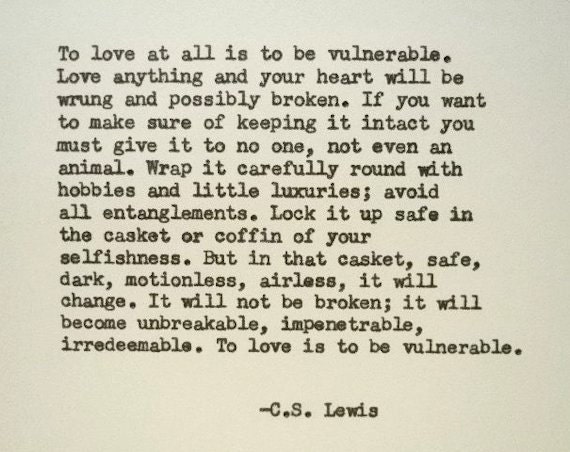

Because “God is Love” (1 John 4:8) understanding how the Greeks distinguished love is helpful. Borrowing from Lewis’s writings, let consider how we should understand love.

He did this by defining and explaining the four Greek words for love used in the Bible- storge (affection), phileo (friendship), eros (romantic), and agape (sacrificial). Not all love is the same, so after addressing distinctions of need and love, Lewis then addressed four categories of love. To his exploration of Need-love and Gift-love, he added what he called “a third element”- Appreciative-love. water for the thirsty) and Pleasures of Appreciation (e.g. In his book, Lewis distinguishes between Need-pleasures (e.g. The book examines love from Christian and philosophical perspectives. Lewis written from a series of radio talks in 1958 and published in 1960. Lewis Doodle.The Four Loves is a book by C. The original file here, and here is a version of Lewis’ lecture on “Agape” with some illustration by C.S. But I suppose it is a story that is common enough to highlight the basic idea: Love is Risk. Lewis is here trying to talk about any love, whether for partner, friend, and family–or even country, hobby, pet, or God. I also wish the story wasn’t about boy-girl relationships with the stereotypical brute-male/hurt-girl/saviour-boy story.

Lewis on social media–misquotes that have inspired William O’Flaherty‘s The Misquotable C.S. It is better than the vast majority of the quote posters about C.S. The artist here, Gavin Aung Than, chooses to follow the text for the most part, making a bit of a shift in order and word choice here and there. It’s intriguing to me that Lewis exchanges “resistant to all good and joy” for the word “irredeemable.” It is a profound theological difference–and perhaps the key question in Lewis’ book, The Great Divorce. This passage is pretty similar in the book and the original lecture series. And this means that in the long run, the alternative to tragedy, or at least to the threat of tragedy, is damnation, for in that casket – safe, still, and unventilated in the darkness – it will go bad not broken, but finally unbreakable, impenetrable, resistant to all good and joy…. You must carefully wrap it round with hobbies and little luxuries and routine and avoidances of entanglement, and then lock it up in the casket or coffin of your own selfishness. If you want to make sure of keeping it intact, you must give it to no one and nothing, not even an animal. Love anything, and your heart will certainly be wrung and possibly be broken.

In returning to the text, I was reminded by a student of a cartoon infographic by an artist that captures the “To love at all is to be vulnerable” moment in the Agape lecture of The Four Loves: Lewis, Gender, and The Four Loves” tonight (you are welcome to join, but must sign up here).


 0 kommentar(er)
0 kommentar(er)
